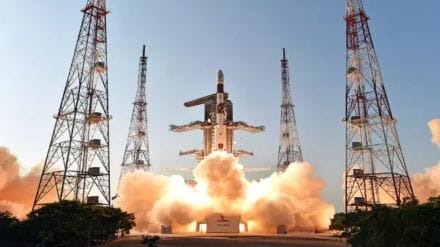The success of India’s moon rover (Chandrayaan-3) has made the space sector hot. According to Google Trends, internet search for the word ‘space’ peaked in India at 6:30 pm on August 23 (26 minutes after Chandrayaan-3 landed on the Moon).
Along with ‘space’, search keywords such as ‘space jobs’, ‘ISRO jobs’ and ‘space career’ also peaked around August 23-24. This implies that Chandrayaan-3 made thousands of Indians – possibly mostly students – think of pursuing a career in the space industry.
Jobs in the space industry
Prof Santabrata Das, Department of Physics, IIT Guwahati, told FE that space isn’t just about astronauts and aerospace engineers. “There are hundreds of job roles in the space industry. Obviously, a lot of job roles pertain to STEM (science, technology, engineering and mathematics), but there is room for everyone,” he said. “The space industry needs accountants, managers, statisticians, and offers possibly all kinds of job roles any thriving industry will offer.”
As far as jobs with the Indian Space Research Organisation (ISRO) are concerned, he said these are limited as compared to the overall industry. “There are entries for BTech and MTech students from across engineering colleges into the ISRO,” Prof Das said. “In addition, students at the Indian Institute of Space Science and Technology (IIST) can find direct entries into the ISRO.”
The IIST, based in Thiruvananthapuram, Kerala, is a government-aided institute and deemed university for the study and research of space science. It is the first university in Asia to be solely dedicated to the study and research of outer space.
Number of jobs
While there is no up-to-date study on how many jobs the space industry in India offers, the ISRO had recently noted that its activities have led to the growth of an allied ecosystem, with more than 500 MSMEs, PSUs and large private industries contributing significantly to the Indian space programme. “The involvement of industries in space activities has created jobs for around 45,000 people in the country,” the ISRO noted. “Many sectors like defence production, telecom, materials, chemicals and precision engineering have benefited from this exercise.”
Arun Kumar R, assistant professor, Department of Mechanical Engineering, IIT Jodhpur, added that space science is interdisciplinary. “Space science is a culmination of various programmes (mechanical, thermal, electrical, electronics, and so on), and there is no single entry into the field of space,” he said. “Irrespective of the stream, you will find a route into the space industry.”
Jobs in allied industries
Prof Kumar said that in addition to the ISRO, there are a lot of jobs with the new-age start-ups entering the space industry. “The private sector offers a lot of opportunities, including in satellite manufacturing, as well as jobs in space software such as developing apps,” he said. “Students must remember that jobs that are suited for the space industry are also suited for missile, radar and the broader defence sector. In case they aren’t able to find a job in the space industry, there will be many more jobs in allied industries.”
Jobs in foreign countries
A placement expert FE talked to said that because space is a rising industry, there are jobs in dozens of countries. “According to our research, there are 77 space agencies around the world, and 16 of these have launch capabilities,” he said. “The space industry offers a universe of options. In case you have a skill or two extra – such as you are an expert in a foreign language – you can work anywhere in the world.”
He added that new-age skills such as problem-solving, critical thinking, teamwork and attention to detail – which are important to work in any industry, any sector – are important for space as well.
As far as specific job roles are concerned, he said there are four categories:
Engineers: Mechanical, aerospace, electronic, electrical and thermal engineers, in addition to test technicians, electrical technicians and robotics engineers.
Information technology: Software and systems engineers, data analysts, cloud architects, software developers, cybersecurity specialists, CAD designers, technical writers, and related roles.
Scientists: Meteorologists, geologists, biologists, climatologists, and anyone who can analyse space and satellite data.
Non-STEM roles: From managers and accountants to sales and business strategy experts, non-STEM roles form a bulk of space industry jobs.
Studying at the IIST
In case you want to pursue STEM-related job roles specifically in the space industry, the IIST appears to be a safe bet. It offers courses in aerospace engineering, avionics, astronomy, astrophysics, Earth System Science, Solid State Physics and Optical Engineering. Admissions are based on the Joint Entrance Examination (Advanced) conducted by IITs, as per guidelines set by the IIST.
Apart from this, the IIST also offers postgraduate programmes in 15 areas of space science, space engineering and related areas.
But an industry expert said that students should choose the IIST only and only if they want to work in the space and allied industries. “At IITs and other top colleges, you can get jobs not only in core engineering fields, but also in areas such as banking or finance,” he said. “At the IIST, most companies who come for placements come with a mindset that they have to hire for core space jobs.”
